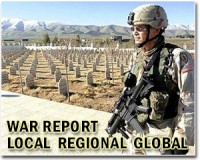 |
Brussels (AFP) March 2, 2011 NATO allies were split Wednesday on deploying an air mission to police Libya's skies, with fears raised about angering the Arab street in a complex operation requiring bombing raids. As forces loyal to Moamer Kadhafi reportedly launched air strikes on a rebel-controlled town in eastern Libya, ambassadors from the 28-nation alliance's decision-making body, the North Atlantic Council, were to discuss the Libyan upheaval at a regular meeting in Brussels, a NATO official told AFP. The United States and Britain have raised the possibility of creating a no-fly zone to prevent Moamer Kadhafi from launching air raids against his own people, with London claiming that a UN mandate was not necessarily needed. France however has insisted any military action would require UN backing. "There is no unanimity within NATO for the use of armed forces," US Defence Secretary Robert Gates said in Washington. French Foreign Minister Alain Juppe raised concerns about how any operation would be viewed in an Arab world facing popular revolts against autocratic regimes. "I don't know what would be the reaction on the Arab street, if Arabs around the Mediterranean saw NATO forces landing on southern Mediterranean territory," he said. "I think that could be extremely counter-productive." Turkey, an influential NATO member with a majority Muslim population, rejected the idea of military action in Libya, saying the alliance could only intervene when one of its members is attacked. "This would be absurd," Turkish Prime Minister Recep Tayyip Erdogan said during a visit in Germany this week, according to Anatolia news agency. "NATO has no business being there." "We are opposed to such a scenario. Such an eventuality is unthinkable," he said. The United States has not ruled out enforcing a no-fly zone over Libya but military brass warned this would first require bombing the Kadhafi regime's radar and missile defences. "It wouldn't simply be telling people not to fly airplanes," said General James Mattis, head of the US Central Command. During a meeting with EU foreign policy chief Catherine Ashton on Tuesday, NATO Secretary General Anders Fogh Rasmussen also said an aerial mission over Libya would be complicated because of humanitarian operations on the ground, a European diplomat said. Backed by US military firepower, NATO has a vast list of assets available to undertake a complex mission. Germany hosts a fleet of AWACS, large radar and surveillance aircraft that can monitor the skies, while US bases in Italy could serve as a staging area for operations. The military alliance enforced a UN-mandated no-fly zone once before in Bosnia during the Balkans war in the early 1990s. Rasmussen too has made clear that any alliance involvement in a no-fly zone in Libya would require UN approval. Winning a UN mandate could prove difficult, with the foreign minister of Russia, a veto-wielding member of the Security Council, dismissing talk of a no-fly zone as "superfluous."
Share This Article With Planet Earth
Related Links
 Third Greek ferry of Chinese fleeing Libya arrives in Crete
Third Greek ferry of Chinese fleeing Libya arrives in CreteHeraklion, Greece (AFP) Feb 26, 2011 A third Greek ferry chartered by China to evacuate its nationals from Libya cast anchor in the port of Heraklion on the southern Greek island of Crete early Saturday. The Venizelos, which had come from the Libyan second city Benghazi, now in the hand of insurgents, immediately began disembarking its 2,911 passengers. The Olympic Champion and Hellenic Spirit had already put into Heraklion ... read more |
|
| The content herein, unless otherwise known to be public domain, are Copyright 1995-2010 - SpaceDaily. AFP and UPI Wire Stories are copyright Agence France-Presse and United Press International. ESA Portal Reports are copyright European Space Agency. All NASA sourced material is public domain. Additional copyrights may apply in whole or part to other bona fide parties. Advertising does not imply endorsement,agreement or approval of any opinions, statements or information provided by SpaceDaily on any Web page published or hosted by SpaceDaily. Privacy Statement |